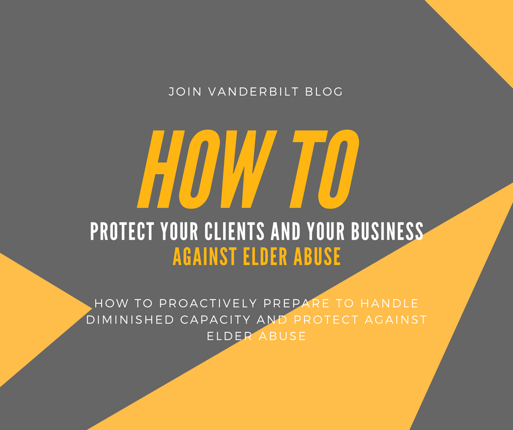In last week’s blog post, “Elder Abuse: Avenues of Attack” we highlighted ways that elder clients are vulnerable to being abused and taken advantage of. We outlined the avenues of attack so that you can now identify red flags when they arise and take action to protect your clients and your business.

Remember, if your clients are victims of elder abuse, they are at risk of compromising their finances, and in turn, your business.
Older Americans control $18 trillion in assets, including two-thirds of all bank deposits in the US. Every day these Americans become victims of elder abuse and scams, with the average victim losing $120,000. Annually, that number adds up to $3 billion in addition to the $1 billion in losses borne by financial institutions each year.
Vanderbilt Chief Compliance Officer, Barry Champney, highlighted the issue of diminished capacity and elder abuse at this year’s Sales and Compliance Meeting;
“We’re not doctors. We can’t tell anything over the phone, we can’t just say ‘Oh, this client has diminished capacity,’ but it is an issue that you’ll be held accountable for.”
Of course, as Financial Advisors, we can’t diagnose, but people can quickly accuse us for negligence when diminished capacity occurs. By putting procedures in place proactively you protect yourself from hugely damaging possibilities.
There are several simple things you can do to protect yourself and your clients against the consequences of elder abuse. Here are just a few;
1. How to Protect Yourself
Establish relationships with your client’s beneficiaries or children – almost like an emergency contact.
Imagine you have a phone call with your client and sense suspicious activity or diminished capacity. By having an appointed and authorized “emergency contact,” you are now able to alert that person of your concerns and suggest that you all meet as a group.
By taking this step, you protect yourself. If a client suffering from diminished capacity makes a trade, then forgets, it’s easy to blame you. The presence of a trusted contact will alleviate this problem saving you from possible legal accusations.
(You can download our Trusted Contact Sample Form below.)
2. How You Can Help Protect Your Clients
Schedule educational seminars for your older clients (or clients who have aging parents) to learn about the red flags, how to identify them, and how to combat them. Seminar ideas could be; Cyber-security, Elder Planning, How to Identify Scams, and more. Hosting seminars for clients is a great way to fight elder abuse and build your business.
3. Who Else Can Help?
This escalating issue has garnered a lot of attention bringing help on the way!
- Congress is considering passing a “Senior Safe” Act
- The AARP runs a BankSafe program for older Americans
- FINRA has proposed new rules to help firms and advisors protect seniors, and protect those firms in the process.
4. What is FINRA Doing?
- FINRA is proposing rules to require firms (an thus, advisors) to ask older clients for a trusted contact person
- "Qualified Persons” at Broker Dealers may freeze older client’s accounts if fraud or abuse is suspected.
- For more, see FINRA’s Regulatory Notices 15-37 which now includes “Financial Exploitation of Seniors and Other Vulnerable Adults” or Proposed Rules 4512 and 2165
What this all boils down to - BE PROACTIVE.
Be observant, thorough and careful. By giving in depth attention to at risk elder clients you can protect them from devastating losses.To take the first step to protect yourself, download our sample Trusted Contact Form below to gather "emergency contacts".

